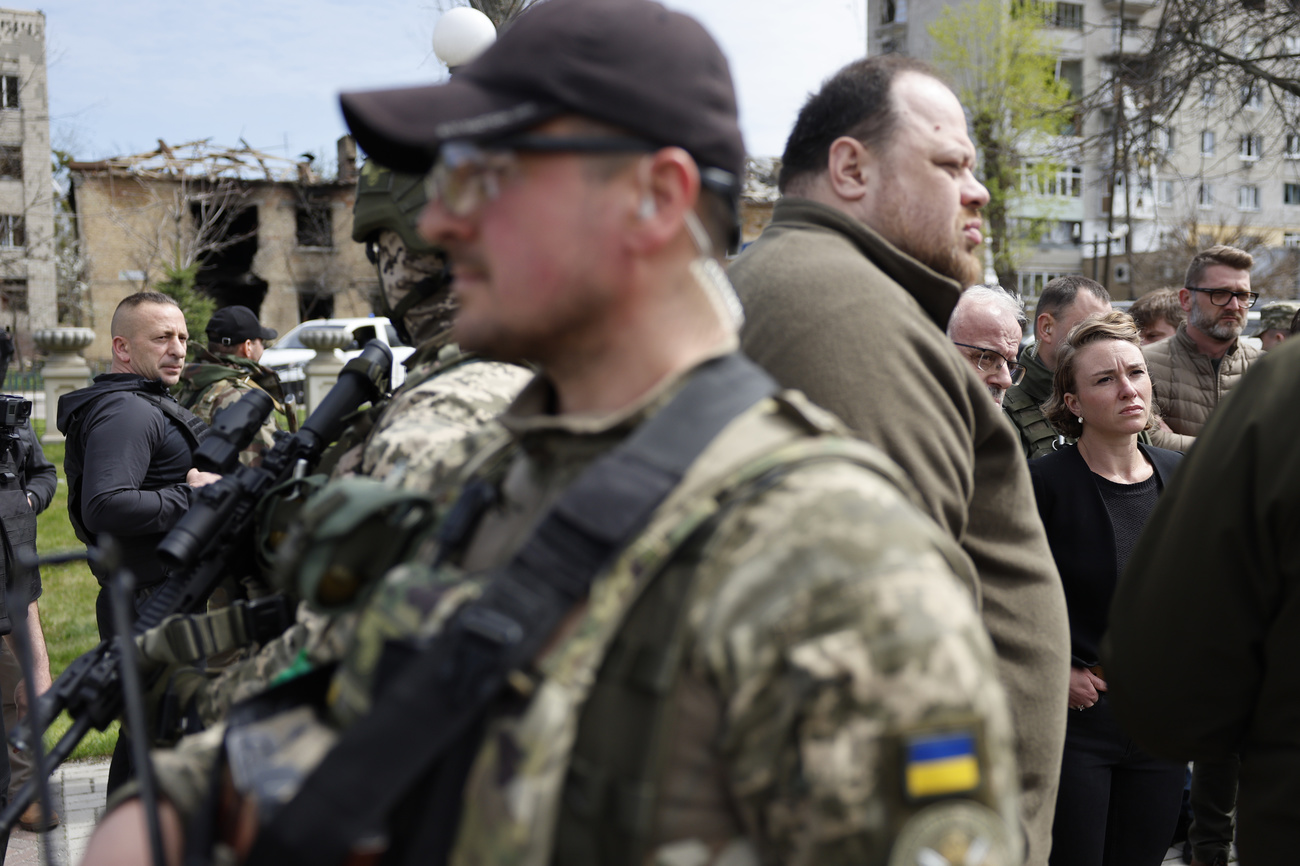
Calls grow louder for Switzerland to redefine neutrality

A Swiss parliamentary visit to Kyiv and an ammunition export ban last week have reignited debate in political circles about how Switzerland defines neutrality. The Sunday papers capture the key dividing lines.
The fact that “neutrality needs to be redefined is undisputed by politicians from left to right,” writesExternal link the Swiss public broadcaster SRF on Sunday. Following Russia’s invasion of Ukraine, Switzerland joined EU sanctions against Russia in what many called a departure from the country’s neutrality stance. The Swiss government has defended the move by stating that the country is not neutral when it comes to violations of international law.
Last week, however, the debate flared up again when a small parliamentary delegation travelled to Ukraine, which some politicians saw as inconsistent with Switzerland’s policy of neutrality. This coincided with reports that the Swiss government has rejected requests from Germany to re-export Swiss-made ammunition used in anti-aircraft tanks destined for Ukraine. The economics ministry cited Swiss policy of neutrality, which forbids it from sending war materiel to conflict zones.
According to Swiss media reports, several politicians are now calling for more flexibility when it comes to war materiel exports. “I cannot understand why we are not supplying weapons to an aspiring democracy in Europe that has to defend itself on its territory, while we are doing this to countries that don’t share our values in any way over and over again,” parliamentarian Beat Flach from the Liberal Green party toldExternal link the NZZamSonntagExternal link.
Flach along with some other members of his party are calling for what the paper referred to as a “radical reinterpretation of neutrality”. “I want to allow arms exports if a democracy has to defend itself on its own territory,” said Flach.
The reaction is mixed from other political parties. Some politicians from the right-wing People’s Party, interviewed by the paper, said that neutrality is non-negotiable but that they would be open to relaxing the War Materiels Act, which was only tightened last autumn. One politician from a centrist party is more reluctant, stating that this would be a total change in direction and would mean taking part in a war. On Saturday, other politicians from the centre had called for discussion on a new definition of neutralityExternal link in this context.
What history tells us
In an interview in the NZZamSonntag, Swiss historian Georg Kreis argued that a distinctionExternal link should be made between direct deliveries of ammunition and consent to the transfer of previous deliveries to another country. He also thinks a distinction should be made between war materiel used for offensive versus defensive purposes.
Either way, he adds, “it is not the understanding of neutrality that determines what is possible, but the law on the export of war material”. Principle and practice have diverged many times in history including Switzerland’s cooperation with the US during the Cold War and the so-called war on terror.
Switzerland’s neutrality policy has always been “handled flexibly” and as the international situation changes so should the handling of neutrality. “This does not mean giving up neutrality, but greater flexibility in dealing with it,” argues Kreis.
In an interviewExternal link with the SonntagsZeitung, Historian Hans-Ulrich Jost argued that delivering weapons would violate neutrality. However, “neutrality in Switzerland has always been stretchable and kneadable like chewing gum,” said the former Swiss army officer who was a vocal critic of Switzerland’s role in the Second World War.

In compliance with the JTI standards
More: SWI swissinfo.ch certified by the Journalism Trust Initiative

























You can find an overview of ongoing debates with our journalists here . Please join us!
If you want to start a conversation about a topic raised in this article or want to report factual errors, email us at english@swissinfo.ch.